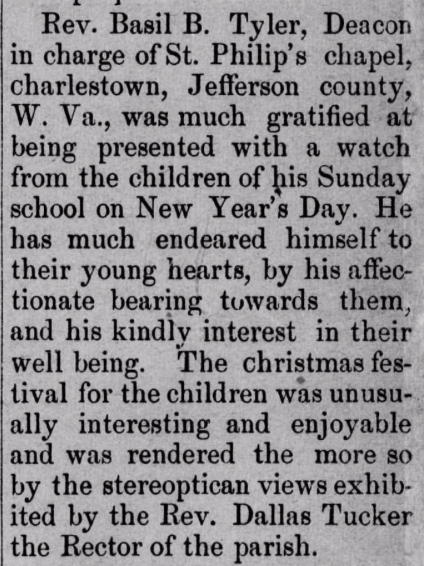Death certificates were newly required in 1909, and undertakers sometimes struggled to complete the personal information section accurately. The basic facts are clear though. Fifty-two-year-old Basil B. Tyler, a minister and native of Piscataway, Maryland, was “killed suddenly by falling timbers.”
What was Rev. Basil Benjamin Tyler, an Episcopal priest, doing in Wilson, and how did he come to his death under a pile of logs?
The News and Observer answered the second question. B.B. Tyler was part of a construction crew building a new Contentnea Guano factory. A truss gave way, sending twenty-three more trusses cascading into one another and destroying the building. Carpenter Junius Woodard and laborer Tobe Bellamy were badly injured. White workers Frank Batts, Speight McKeel, and George Farmer suffered bruises. Basil B. Tyler was killed.
News and Observer (Raleigh, N.C.), 24 November 1909.
The horrible circumstance of Rev. Tyler’s death is clear here, but the reasons he was in Wilson stirring cement at a guano factory are still confounding. He was ordained a deacon in 1883 in the Diocese of Albany, New York, and in 1888 transferred to the Diocese of Virginia, where he headed a mission in Hampton.
On 1 November 1888, in Manhattan, New York, New York, Basil Benjamin Tyler, 29, minister, born in Prince George’s County, Maryland, married Alice F. Davis, 22, born in Dinwiddie County, Virginia, daughter of Thomas Davis.
By 1892, Rev. Tyler was deacon in charge of Saint Philip’s Chapel in Charlestown, West Virginia.
Baltimore Church Advocate, 6 February 1892.
By 1900, the family had returned to Prince George’s County, Maryland, where they appear in the 1900 census of Aquasco District: clergyman Basil B. Tyler, 40; wife Alice F., 38; children Basil B., 10, John J., 8, and James E., 5 months; and boarder Wade W. Butler, 13. Rev. Tyler and his son James were born in Maryland; Alice Tyler and son Basil were born in Virginia; and son John was born in West Virginia.
Baltimore Sun, 29 October 1900.
The published text of Bishop Joseph Blount Cheshire’s address to the Episcopal convention, delivered in 1903, lands Rev. Tyler in Wilson as deacon of Saint Mark’s Church.
Consulting Patrick Valentine’s The Episcopalians of Wilson County: A History of St. Timothy’s and St. Mark’s Churches of Wilson, North Carolina, 1856-1995, I found this:
“… [Rev. John Henry Mingo] Pollard was in charge for two years, then was succeeded by Basil B. Tyler who stayed two years.
“Tyler had been admitted as a candidate for holy orders in Washington, D.C. He then transferred to Virginia, and came to Wilson in 1902. That very year the bishop had to omit St. Mark’s on his Visitation because of the ‘prevalence of small pox among the Negroes’ but visited the next two years. ‘The congregations of late have been generally good,’ Tyler reported in 1903, by which we assume he meant generally ‘good’ in size.
“According to his successor, Tyler ‘was a man of scholarly attainments, an interesting speaker, and most eloquent preacher.’ There were rumors, however, that Tyler’s wife was leading a scandalous life and had the minister ‘completely under her thumb.’ In any case, he ‘failed to arouse any interest in the people scarcely and was forced to with draw [sic].’ He left in 1904 for South Carolina.”
Valentine adds in a footnote: “Tyler later returned to Wilson, was baptized ‘by immersion in the creek hard by,’ and became a Baptist before he ‘crossed the river,'” i.e. died in the wreckage of a collapsing building.
What happened to Tyler between 1904, when he left Wilson to assume a new pastorate in South Carolina, and 1909 when he returned, disillusioned with the Episcopal Church and constrained to manual labor that would kill him?








One comment